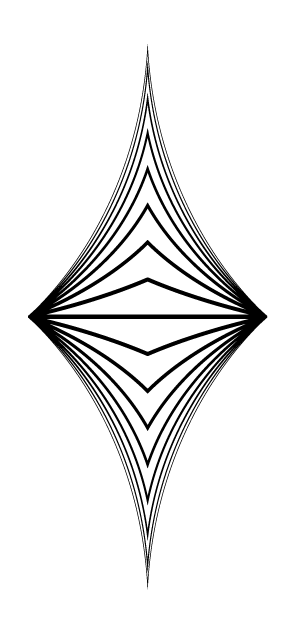Participants
Meet the musicians
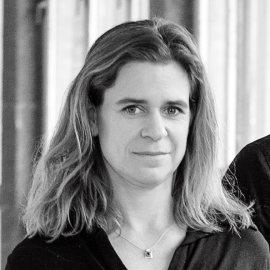
Cosima was born in Berlin in 1975. After studying the cello in Prague, Bremen and Berlin, she devoted her work increasingly to contemporary music. Cosima is a member of the Sonar – Quartet and the duo tocar and performs frequently with Ensemble Resonanz. She joined KNM Berlin in 2008.
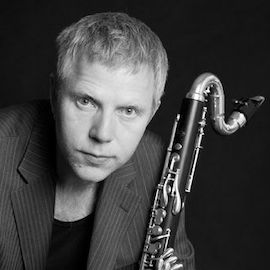
Theo is a performer and composer and has been a member of KNM Berlin for many years. He plays with Klangforum Wien and Ensemble Modern and also composes for theatre, dance and television productions. He has been playing Wolfgang Stryi’s Selmer contrabass clarinet since 2007, kindly supported by Bruno Waltersbacher. www.nabicht.de
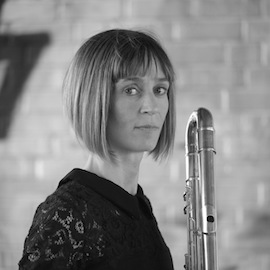
Born in England, Rebecca studied at the Guildhall School of Music and Drama, London, and at the Music Academy, Basel. She joined KNM Berlin in 2002 and formed KNM Ganesha together with Gudrun, Winfried and Robin in the same year, commissioning several new works for this unique combination. Rebecca has performed throughout Europe with the Royal Opera House Orchestra, Covent Garden, Klangforum Wien, London Philharmonic Orchestra…
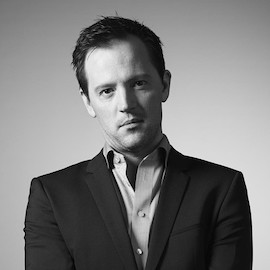
As a clarinettist, Robert Ek specializes in contemporary music as a chamber musician and soloist. With great curiosity and commitment, together with composers, he tries to develop the repertoire for his instrument. He has recorded around twenty records and premiered a large number of works as a soloist and as a chamber musician.
He has been a member of the acclaimed ensemble Norrbotten NEO since 2007, Sweden’s only full-time ensemble ensemble for contemporary music. Every year, Norrbotten NEO premieres a number of works by Swedish and international composers. In 2012, the ensemble received fst’s performer award for its work with contemporary music.
Robert has performed and collaborated with musicians, composers and conductors from different parts of the world. He enjoys working in the borderland between art forms and has had close collaborations with not only composers but also with writers, choreographers and filmmakers.
Robert has toured in Europe, North America, Asia and Australia and performed at festivals such as Warsaw Autumn, Huddersfield Contemporary Music Festival, June in Buffalo, Faithful (Berlin), ISCM world music days in Stockholm and Tallinn, Musica Viva (Lisbon), Beijing Moden Music Festival.
His work in developing the repertoire has in recent years focused on live electronics and developing the clarinet as an instrument. Robert has also been a doctoral student at LTU since 2019, where the subject of his dissertation is “the augmented clarinet in intermedial chamber music performance.” The purpose of this dissertation is to examine the artistic possibilities from a multimodal perspective on musical performances with a focus on sensor data from musicians movements can be a structural part in creating intermedial performing arts.
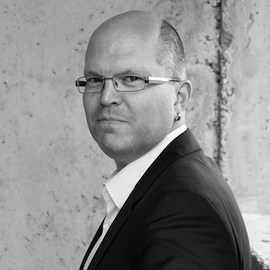
Born into a family of musicians, Swedish percussionist Daniel Saur’s future was predestined: a life in music!
He focused his musical studies on percussion early on, and studied at the Music Conservatory in Falun, before joining the Royal Swedish Army Band. After studies at Framnäs Folkhögskola he later completed his Master of Music degree at the School of Music in Piteå in 2000 and has since then worked as a freelance musician and percussion teacher.
Daniel is a founding member of the professional percussion ensemble Global Percussion Network (GPN). With GPN he has given performances, seminars, and master classes throughout Europe, North America, and Asia, including radio and television broadcasts in Sweden, USA, and Japan. GPN has performed at festivals all over the world, premiered countless pieces, played entire concerts on ice instruments, and even performed on a Jet Fighter from the Royal Swedish Air Force.
Norrbotten-NEO (NEO) is one of Sweden’s leading ensembles for contemporary music, where Daniel is a full time member since 2008. NEO has a core ensemble of seven musicians: flute, clarinet, percussion, piano, violin, viola and cello. The ensemble focuses on commissioning new works from the leading composers of Swedish and Europe. Daniel´s employment in NEO also includes serving as timpanist in the Norrbotten Chamber Orchestra and percussionist in Piteå Chamber Opera Company. Because of these diverse ensembles, Daniel regularly performs everything from Mozart symphonies, contemporary music to grand, multi-media opera shows.
Since 2001 Daniel has been the Director of Percussion Studies at the School of Music in Piteå at Luleå University of Technology.
Prior to this angagement he ran the Percussive Institute at Framnäs Folkhögskola from 2004-2007.
Additionally, during 2007 Daniel had a 6-month residency at Universidad de Ciencias y Artes de Chiapas (UNICACH) in Chiapas, the southernmost state of Mexico.
As a composer Daniel has received numerous commissions and has had his works premiered in Argentina, Japan, Mexico, Sweden, and USA.
Daniel is a proud endorser of Innovative Percussion Inc.
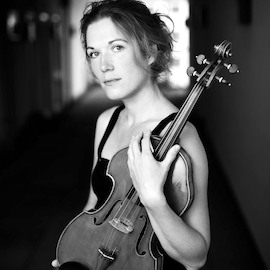
Born in Sweden, Mina Fred has studied viola with Claus Myrup at the Royal Conservatory of Music, Århus, Denmark, where she received her diploma in 2004 and furthermore graduated with a Specialized Masters Degree in solo performace in 2007. She has also been a pupil of David Takeno at the Guildhall School of Music and Drama in London, England (2002-2003) as well as at The Banff Centre for the Arts in Banff, Canada (2001-2002). A growing interest in free improvisation led Mina to Basel, where she in 2014 took a masters degree in Free Improvisation at the Hochschule für Musik with professors Alfred Zimmerlin and Fred Frith.
Very active both as chamber musician and solo performer, Mina is performing vastly in the scandinavian countries, and as well internatinally. As a passionate performer of contemporary repertoire and chamber music, Mina is frequently performing at numerous festivals.
From 2007 to 2010 Mina was employed as solo violist in The Jutland Ensemble, Viborg, Denmark. She is currently assistant principal viola of the Danish Chamberorchestra and and solo violist of Athelas Sinfonietta Copenhagen.
Mina teaches viola at Orkester Norden’s summer courses in Lahti, Finland and regularly coaches workshops in improvisation.
Composers
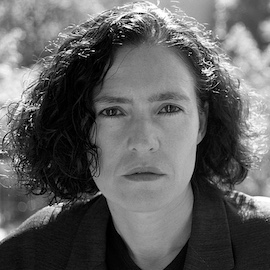
Ana Maria Rodriguez links the spontaneity of improvisation with fully composed scores. Often she takes part in the performances of her own works and can be seen on stage on the keyboards or as a laptop artist. At the same time, she also works with the acoustic and architectural conditions of the performance space when creating her compositions, installations and scenic works. Thematically, her latest pieces could be said to revolve around the relation between poetry and technology. This relationship does not only comprise the compositional use of words, poetry and literary sources, but also in a more abstract way the musical utilization of technological means to create a richness of perspectives based on poetry. Heterogeneous time layers, diverse spaces, plots running contrary to logic as in poetry—Ana Maria Rodriguez is committed to expressing herself in a precise and sensuous way.
Ana Maria Rodriguez studied composition, piano, history, and philosophy in Buenos Aires. She moved to Barcelona where she additionally studied electronic music and algorithmical composition at Phonos Studios. In 1993 the Fraunhofer Gesellschaft (Germany) invited her to develop several audio projects for its Artificial Intelligence faculty. Since this time Rodriguez has composed many pieces, concert installations, mixed media or music theater works for a wide range of instruments using live-electronics and computer technology.
In 2005 she founded the only women ensemble “Les Femmes Savantes” in which Ana Maria performs as an object, keyboard and laptop player. She collaborated with many artists from different genres like Melita Dahl, Andreas Köpnick, Joanna Rajkowska (video) and the poet Ron Winkler. Since 2015 she develops in close cooperation with the Belgian director Ingrid von Wantoch Rekowski and the American stage designer Fred Pommerehn the MusicTheaterInstallation „The Stereoscope City“ with performances in Reims (2015), Marseille (2016), Berlin (2016), Hannover (2017) and Kaohsiung (Taiwan/2019).
Ana Maria Rodiguez’ works has been performed at the major festivals throughout Europe and abroad: Berlin in Lights (Carnegie Hall NYC), Brückenmusik Köln, Chiffren‑Biennale Kiel, Donaueschinger Musiktage, Foro International de Música Nueva Mexico City, Forum Neuer Musik (DLF Köln), Heroines of Sound Festival Berlin, KunstFestspiele Herrenhausen, Les Musiques Marseille, MaerzMusik-Festival für Zeitfragen, November Musik Essen, Poesiefestival Berlin, Scènes d’Europe Reims, Tage für neue Kammermusik Witten, Transmediale Berlin, Wiener Festwochen, Wien Modern…
Ana Maria Rodriguez lives and works in Berlin.
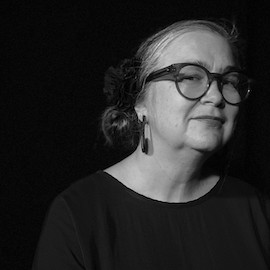
Cat Hope is a composer and performer who creates music that is conceptually driven, in animated graphic scores formats for acoustic / electronic combinations and improvisations. Her music is characterised by aleatoric elements, drone, noise and glissandi as well as an ongoing fascination with low frequency sound that threads through all her creative work.
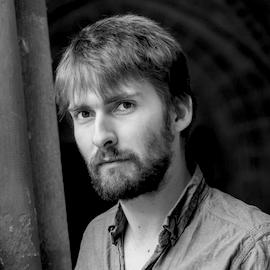
Malte Giesen studied composition / computer music at the State University of Music and Performing Arts Stuttgart with Marco Stroppa and Oliver Schneller, followed by further studies at the CNSM Paris with Gérard Pesson, at the HfM Berlin with Hanspeter Kyburz and electroacoustic music with Wolfgang Heiniger.
He was a fellow of the GdF MH Stuttgart, Oscar and Vera Ritter Foundation and of the Foundation of the HfM Berlin, Elsa Neumann Scholarship Berlin. He has won the German Music Competition composition 2009, the master class orchestral composition of the RSO Stuttgart 2012, the competition New Scenes III of the Deutsche Oper Berlin 2015, the composition prize Carl von Ossietzky the city of Oldenburg 2016 and composition prize of the city of Stuttgart 2017. In 2018 he was selected as representative composer of Germany @ the ECCO project of the ECSA general assembly Brussels. Composer’s prize winner 2021 of the Ernst von Siemens Music Foundation.
He was teaching contemporary improvisation at the University of Music Karlsruhe and electroacoustic music at the HfM “Hanns Eisler” Berlin.
Since 2021 he is Head of Studio for Electroacoustic Music at the Akademie der Kuenste Berlin.
His works are being performed in Germany and abroad, among others by the RSO Stuttgart, Sonar Quartet, Quatuor Diotima, sonic.art Saxophone Quartet, Ensemble Ascolta, ensemble recherche, Ensemble Mosaik, l’instant donnée, Ensemble Kuraia, Neue Vocalsolisten Stuttgart, Ardey saxophone quartet, Namascae Lemanic Modern Ensemble, SUONO MOBILE globally at various festivals, including Donaueschingen Festival, Wien Modern, Klangwerkstatt Berlin, AchtBrücken Cologne, Ars Nova Rottweil, blurred edges Hamburg and Wittener Tage für Neue Kammermusik.
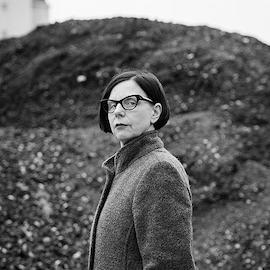
Ann Rosén (born 1956) is the composer, musician and artist who began her career in the visual arts in the 1980s with interactive, intelligent, and intriguing works. Since the 1990s, the artistic focus has been on music and sound art and Rosén has more than one hundred works behind her. The works have been performed at the Swedish Royal Opera, Moderna Museet in Stockholm, and South Bank in London, among others.
Rosén has played at clubs in Berlin and London, participated in everything from underwater concerts to international festivals such as BIFEM in Australia and Sines and Squares in England. Rosén is also one of the founders of Syntjuntan, a trio of composers who for about ten years together with the audience sewed synths and then performed electroacoustic music on them.
Rosén’s art revolves around the exploration of interpersonal communication, how we can understand ourselves in relation to the outside world and the barriers that can arise between us and others.
Meet the developers
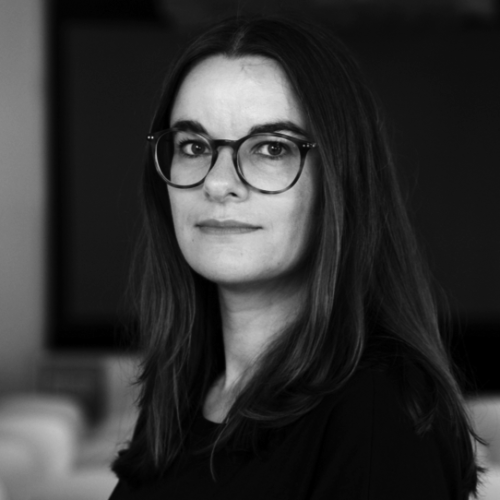
Berit Greinke is a junior professor in Wearable Computing at Berlin University of the Arts and Einstein Center Digital Future (ECDF). Her research focuses on engineering design methods and fabrication techniques for electronic textiles and smart materials, combining crafts with novel manufacturing technologies. Her work is multidisciplinary, informed by research and practice within design, art, physics, materials science and electronic engineering. She aims to initiate innovation and foster a collaborative relationship between arts and engineering disciplines, fluidly crossing boundaries by producing designed objects, installations, performances and cross-disciplinary workshops.
She completed a diploma degree in Textile and Surface Design at Berlin Weissensee School of Art (2007), and an MA in Design for Textile Futures at Central Saint Martins College of Art and Design (2009). She has gained a PhD at the Doctoral Training Centre (DTC) for Media and Arts Technology at Queen Mary University of London (2017). Between 2016 and 2018 she has worked as a researcher and post-doc at Design Research Lab, Berlin University of the Arts and at German Research Center for Artificial Intelligence (DFKI).
Her work has been shown internationally, and has been supported by, amongst others, the Engineering and Physical Sciences Research Council (UK), Medical Research Council (UK), Leverhulme Trust and DAAD.
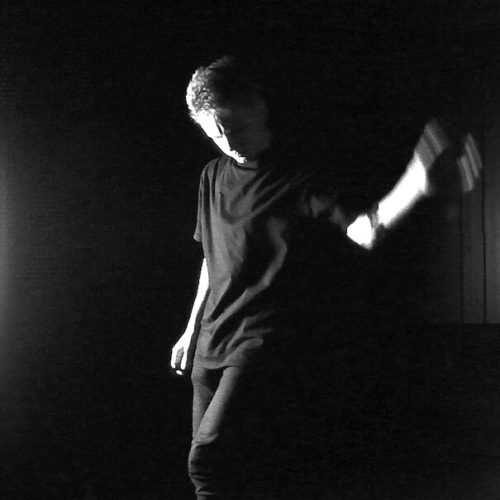
Federico Visi (he/they) is a researcher, composer and performer based in Berlin, Germany. He carried out his doctoral research on instrumental music and body movement at the Interdisciplinary Centre for Computer Music Research (ICCMR), University of Plymouth, UK. His research interests include gesture in music, motion-sensing technologies, interactive machine learning, and embodied interaction. He has worked as a postdoctoral researcher at several European universities, most recently Luleå University of Technology (Sweden) and Goldsmiths, University of London (UK). His research has been published in international academic journals, edited books, and conferences. He currently teaches and carries out research at Universität der Künste Berlin. His work as a performer is centred on the use of body movement and physiological signals in electronic music. Under the moniker AQAXA, they released an EP in which they combine conventional electronic music production techniques with the exploration of personal sonic memories by means of machine learning algorithms.
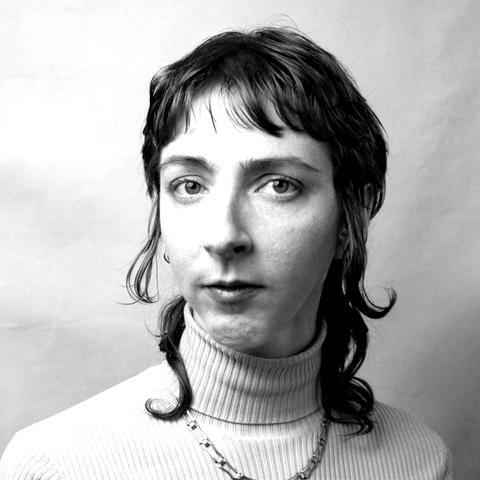
Codi is a multi-disciplinary designer exploring intersections between garments, jewellery and digital technologies. Born in the United States at the foothills of the Appalachians, they moved to Berlin in 2012 and earned a BA in Fashion Design at the University of the Arts Berlin (UdK). They are currently pursuing an MA in Fashion & Technology at Linz University of Arts. Their research is aimed at unearthing alternative approaches to embodiment and virtuality through experimentation with textiles, wearables and bodies in motion.
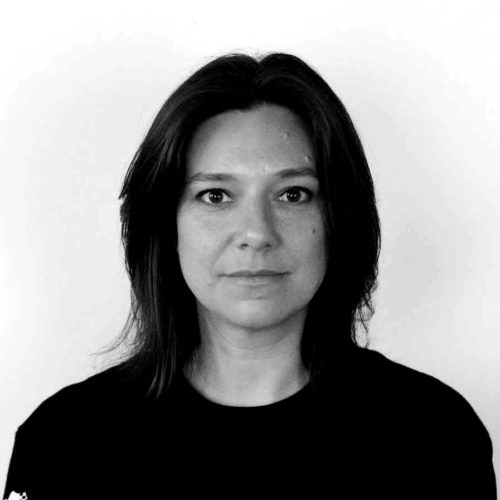
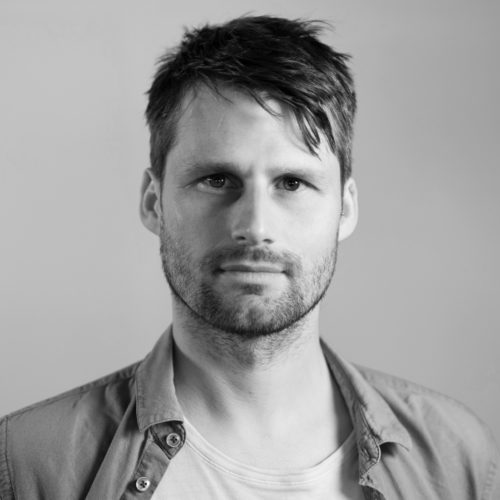
Philipp is a media artist, freelance writer and programmer. He is currently studying in the M.A. Design & Computation at UdK Berlin and TU Berlin and holds a B.Sc. in Media Technology. His work reflects current developments in technology from a media theory perspective.
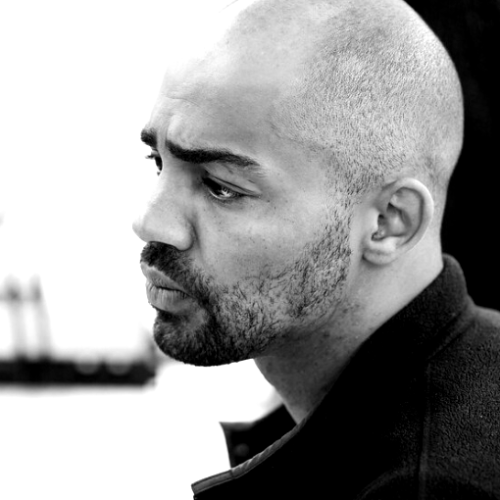
Benjamin has a background in architecture and is currently pursuing an MA in Design and Computation at Universität der Künste Berlin.
Ensembles

Kammerensemble Berlin: KNM stands for the active, current music scene in the metropolis Berlin. Along with other students of former East Berlin’s Hanns Eisler School of Music, Juliane Klein and Thomas Bruns founded the ensemble in 1988. It is now made up of eleven musicians from all over Germany, Great Britain and Switzerland.

Norbotten NEO is the most modern and distinctive voice on the Swedish music scene today! After meticulous preparatory work from Petter Sundkvist and Kjell Englund, the ensemble started up in January 2007, with a grant from the Swedish Arts Council, the municipalities of Piteå and Luleå, and Norrbotten County Council. The ensemble is the only example of its kind in Sweden, being charged with promoting contemporary art music on a national basis. The word ‘Neo’ means simply ‘new’ and reflects both the music performed and the experience offered to audiences. The ensemble consists of seven musicians employed full-time and has Studio Acusticum in Piteå as its home base. Norrbotten NEO performs contemporary music at the highest international level, in a manner which is both exciting and which reaches out to newcomers as well as to experienced listeners. The ensemble has quickly become an essential force in Swedish music life, always stirring and challenging its audiences.
Universities and research insitutions
The UdK Berlin is one of the world’s largest, most versatile and most traditional artistic universities. The courses offered by the faculties of Fine Arts, Design, Music and Performing Arts as well as the Central Institute for Continuing Education / Berlin Career College cover the entire spectrum of the arts and related sciences in over 70 degree programs.

The Einstein Center Digital Future (ECDF) is the center for digitalization research in Berlin. Since its opening in 2017, scientists have been conducting research in the core areas of Digital Infrastructure, Methods, and Algorithms, and in the innovation areas of Digital Health, Digital Society, and Digital Industry and Services. The ECDF is a project based on a large-scale public-private partnership (PPP) between more than 30 companies, organizations, all four Berlin universities, the Charité – Universitätsmedizin Berlin and more than ten research institutions from Berlin science.

Luleå University of Technology is a Public Research University in Norrbotten County, Sweden. The university has four campuses located in the Arctic Region in the cities of Luleå, Kiruna, Skellefteå, and Piteå. With more than 19,000 students and about 1,500 employees, Luleå University of Technology is Scandinavia’s northernmost Institute of Technology. Luleå University of Technology is consistently ranked among the world’s top universities, especially in Mining Science, Materials Science, Engineering, Computer Science, Robotics, and Space Science. The university is famous for its groundbreaking collaborations with various industry partners, such as LKAB, Ericsson, Boliden, ABB, and Epiroc, and its high amount of externally funded research.

